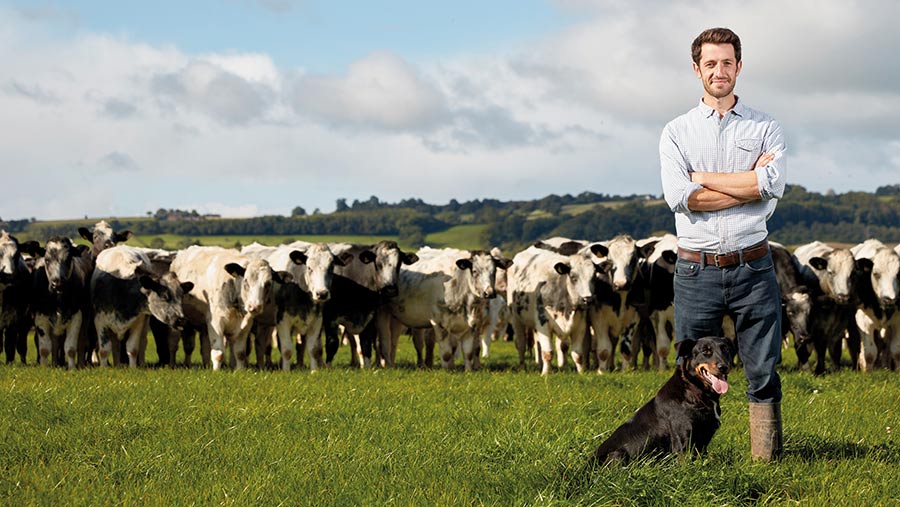Opinion: Radio lets farmers win hearts and minds
 Ian Farrant © Oliver Edwards
Ian Farrant © Oliver Edwards “We would like some background farm noises, so if you could stand in the farmyard, that would make great radio. But make sure you have good recep…”
At that exact moment I must have moved an inch to the left and got cut off.
I legged it over to my dad who was pushing cattle into the crush for weighing (politely suggesting it would be good if the background noises the radio station requested weren’t a selection of his favourite swear words).
See also: Opinion – farming and parenting are tough to balance
About the author

Ian Farrant is a 38-year-old beef farmer from Herefordshire. His farm is part of a larger family partnership with dairy and arable enterprises.
He’s exploring options for regenerative farming and is introducing new enterprises, including planting 6ha of hazelnut trees.
Signal problems
I then returned to the fifth tyre on the right of the silage clamp to regain the trusty single bar of reception that I rely on for contacting the outside world.
The phone rings again and the researcher suggests I use 5G for a clearer signal.
I politely reminded her that this is Herefordshire where we are yet to experience half a G and, if we continue at this rate, my battery will be dead, so she better just hurry up.
After an awkward pause, she informs me I’ll be contacted again in exactly three minutes and hangs up.
I was just contemplating how well organised they had been for BBC Hereford and Worcester, who I’d assumed was conducting the interview, when my phone rang again.
“Hello it’s Evan Davis from Radio 4’s PM programme…”
At that moment, every drop of moisture left my mouth and I struggled to keep my balance.
AHDB had lined me up for the interview weeks before, I must have just heard the “BBC Radio” bit and missed the all-important “4”!
We went on to chat about beef production and the measures we are taking to reduce our carbon footprint and have a positive impact on our local environment.
There were the inevitable questions on veganism, but in a heartbeat it was over and, after stumbling down the silage clamp, I decided it was best I had a post-adrenaline lie down and a slice of Battenburg.
Educating the public
It’s safe to say that farmers’ opinion of the mainstream media isn’t great. In fact, it’s up there with slugs or an overflowing water trough on Christmas Day.
The past decade has seemed like a non-stop barrage of one-sided headlines, further isolating our industry from consumers.
Although most of the issues we are blamed for are a direct result of the general public’s unquenchable thirst for cheap food, we take it on the chin and quietly keep getting up early every morning to ensure the rest of the country has enough to eat.
The urban/rural divide is now bigger than ever. We all moan about the disconnect between the general public and their food, and rightly so.
We’ve heard about surveys that suggest children think chocolate milkshakes come from brown cows, or that pigs provide us with potatoes (I’m not even joking), but we have to shoulder some of the blame ourselves.
Pulling up the drawbridge and keeping our distance from the media may help protect us from direct personal criticism, but how can we educate the public and push for a fairer price for our produce if we are not willing to open up and talk about what happens behind the farm gate?
Media insights
Once the dust had settled on my radio appearance, two things became apparent.
First, fortunately for me, no one I know listens to BBC Radio 4. Second, if I was to practise what I preach, I needed to get a few pointers.
This led me to a great organisation called Just Farmers, which offers an insight into the media to willing farmers.
It was set up by a farmer’s daughter to build confidence when talking to the media, and to help journalists and programme makers find independent, authentic voices at the grassroots of agriculture.
It gave me an understanding of the ridiculous pressures on journalists covering 24-hour news, what makes a great article, how to pitch a story and, most importantly, how to go about answering questions.
There are so many farmers doing incredible things in this country. We are at the start of a new, green farming revolution.
As farmers, we have the potential to help solve huge environmental issues – from climate change to biodiversity loss, water quality to human health.
It’s extremely exciting and we should be telling anyone who is willing to listen.
Don’t get me wrong, talking in public about food production comes with its pitfalls. There will always be a core group of the nutritionally extreme, who will try to shout you down.
Social media, in particular, is the ultimate double-edged sword. But it does give us all a voice and an opportunity to push for change.
There is a new generation of farmers who are taking social media by storm and opening people’s eyes to the realities of farming.
A perfect example is egg producer and fellow Just Farmers member Ioan Humphreys, whose simple three-minute video explaining the real reason behind the egg shortage went viral and ended up on the BBC website.
In sharing his opinion that the blame lay firmly with the supermarkets, he helped consumers understand the world isn’t quite as black and white as it seems.
Good on you Ioan!
Ian’s radio learnings
- Find a good phone reception
- Anticipate and prepare for awkward questions, but don’t read from a script
- Be honest, but try to stay as positive as possible
- Remember to breathe occasionally!
